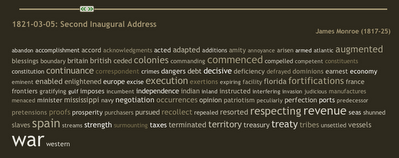Presidential Speech Tag Clouds
 I love playing with Chirag Mehta's U.S. Presidential Speeches Tag Cloud, which has gotten a lot of press in the blogosphere in the last week or so. As a viral phenomenon, most of the obvious interest is in tracking the rise of one word's usage in presidential addresses in the last ten years or so. But as a tool for understanding history this model has a couple of limitations that should be kept in mind.
I love playing with Chirag Mehta's U.S. Presidential Speeches Tag Cloud, which has gotten a lot of press in the blogosphere in the last week or so. As a viral phenomenon, most of the obvious interest is in tracking the rise of one word's usage in presidential addresses in the last ten years or so. But as a tool for understanding history this model has a couple of limitations that should be kept in mind.
First, the role played by official speeches like inaugural addresses and state of the union addresses is decreasing all the time. This has been caused primarily by television. Major speeches are now seen as moments to establish watersheds for a particular cause, to be sure, but more often they are a president's conscious bid to speak "to history" because they think such speeches will automatically make the highlight reels and history books. While this in itself can be telling, it doesn't necessarily give the clearest picture of what was going on at the time. Thankfully, the further we travel back in the past, and (presumably) the less the general public knows about the historical period, the more important such speeches actually were, because they were among the only presidential communications that reached a wide audience. Sort of the opposite of a catch-22.
Second, the presence or even size of a tag tells us nothing about the context of the speech. This is an interesting problem to have because it is a problem not just of tag clouds but of the Internet in general; with so much context being stripped out to retain only "keywords," the fact that context is key is made ever more clear. Take, for example, James Monroe: Monroe established the Monroe Doctrine, which demanded that European nations stay out of the Americas and defined the entire North and South American continents as the unique "sphere of influence" of the United States. I haven't looked it up, but I suspect that all of the references to "war" - the most highly tagged and thus largest item in the cloud - were negative references, that is, citations of the negative effects of, and desire to avoid, wars which Monroe believed (or at least claimed) that U.S. supremacy in the region would resolve. We have none of those thoughts when we see the word "terrorism" tagged large in George W. Bush's speeches, and we are probably right in our assumption about the contexts in which that word was spoken; but if a politician gave a speech about the overdramatization of terrorist threats, we would see the same large tag but probably not recognize that its context was entirely different.
Monroe established the Monroe Doctrine, which demanded that European nations stay out of the Americas and defined the entire North and South American continents as the unique "sphere of influence" of the United States. I haven't looked it up, but I suspect that all of the references to "war" - the most highly tagged and thus largest item in the cloud - were negative references, that is, citations of the negative effects of, and desire to avoid, wars which Monroe believed (or at least claimed) that U.S. supremacy in the region would resolve. We have none of those thoughts when we see the word "terrorism" tagged large in George W. Bush's speeches, and we are probably right in our assumption about the contexts in which that word was spoken; but if a politician gave a speech about the overdramatization of terrorist threats, we would see the same large tag but probably not recognize that its context was entirely different.







No comments:
Post a Comment